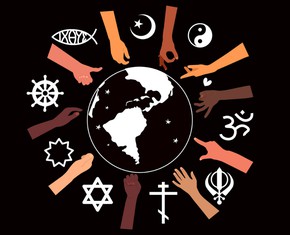The views expressed in our content reflect individual perspectives and do not represent the authoritative views of the Baha'i Faith.
What would you do if you had a free day—not just one without any scheduled work or activities, but instead one completely outside of time itself?
Many of us, as well as countless writers, philosophers and physicists, have pondered that question, contemplating the linear nature of the onward progress of this material existence, its inexorable forward march and how we might possibly step outside the ticking tyranny of time.
But as physical creatures bound by natural cycles, no one has yet figured out a way to escape the clock. Despite their ubiquity in films and TV shows, nobody has a time machine. Time moves on relentlessly, in clocks and in our bodies, constantly reminding us that we’re all subject to its passing minutes, hours and days. “No one can save time,” the old saying goes—because once the present turns into the past, it is lost forever.
So while the clock and the calendar stop for no one, the Baha’i teachings do designate a special period each year for joy and gladness that can symbolically transcend time—that annual span of four or five days known as Intercalary Days, or Ayyam-i-Ha. The concept, as well as the definition of the Arabic word “Ha” takes some explanation to understand.
First of all, the four or five Baha’i intercalary days every year precede the last month in the Baha’i calendar, known as “Ala,” or “Loftiness.” During that subsequent month, Baha’is all over the world take part in the annual Baha’i Fast, nineteen days of inner reflection, abstention from food and drink during the daylight hours, and prayer and meditation. During that “season of restraint,” as Baha’u’llah called it, Baha’is endeavor to observe:
… a period of meditation and prayer, of spiritual recuperation, during which the believer must strive to make the necessary readjustments in his inner life, and to refresh and reinvigorate the spiritual forces latent in his soul. Its significance and purpose are, therefore, fundamentally spiritual in character. – Shoghi Effendi, Directives from the Guardian, pp. 28-29.
Second, just like the fasting month called Ala, each month of the Baha’i calendar has a name. Those designations—which came directly from the Bab, the prophet of the Babi Faith and the herald of Baha’u’llah’s subsequent revelation—list 19 “Names of God.” Those names represent some of the attributes of the Creator: Splendor, Glory, Beauty, Grandeur, Light, Mercy, Words, Perfection, Names, Might, Will, Knowledge, Power, Speech, Questions, Honor, Sovereignty, Dominion and Loftiness. These attributes or characteristics, the Baha’i teachings say, can identify and then give us a glimpse of God’s qualities:
To man, the Essence of God is incomprehensible, so also are the worlds beyond this, and their condition. It is given to man to obtain knowledge, to attain to great spiritual perfection, to discover hidden truths and to manifest even the attributes of God; but still man cannot comprehend the Essence of God. – Abdu’l-Baha, Abdu’l-Baha in London, p. 66.
Phenomenal, or created, things are known to us only by their attributes. Man discerns only manifestations, or attributes, of objects, while the identity, or reality, of them remains hidden. For example, we call this object a flower. We understand that the qualities appertaining to this organism are perceptible to us, but the intrinsic elemental reality, or identity, of it remains unknown. Its external appearance and manifest attributes are knowable; but the inner being, the underlying reality or intrinsic identity, is still beyond the ken and perception of our human powers. Inasmuch as the realities of material phenomena are impenetrable and unknowable and are only apprehended through their properties or qualities, how much more this is true concerning the reality of Divinity, that holy essential reality which transcends the plane and grasp of mind and man? – Abdu’l-Baha, The Promulgation of Universal Peace, pp. 421-422.
Third, our limited human perceptions can sometimes allow us a brief impression of the transcendent reality beyond mere attributes:
Meditating upon these sublime attributes, man is enabled to gaze beyond the curve of time, wherein the swing and change of planetary movements exists, to the eternal qualities that stabilize the soul. As the seasons return with their quaternary beauty, as the seed sacrifices to the mystery of the harvest, we see reflected in the mirror of the physical world the spiritual spring-time when the Word of God is planted in the heart of man by the coming of God’s Messengers. – Shoghi Effendi, Principles of Baha’i Administration, p. 53.
Finally, Ayyam-i-Ha—the Days of Ha—represent that transcendence, that gazing “beyond the curve of time.” Ha, the fifth letter of the Arabic alphabet, also symbolizes the timeless essence of God.
In each month of the year, Baha’is contemplate the attribute of the Creator exemplified by the name of that month. But during the Intercalary Days, those sacred days “outside of time,” we can all celebrate and commemorate the greatness of God beyond any individual attributes we associate with the Supreme Being:
We have ordained that these, amid all nights and days, shall be the manifestations of the letter Ha, and thus they have not been bounded by the limits of the year and its months. It behoveth the people of Baha, throughout these days, to provide good cheer for themselves, their kindred and, beyond them, the poor and needy, and with joy and exultation to hail and glorify their Lord, to sing His praise and magnify His Name … – Baha’u’llah, The Most Holy Book, p. 24.
The joy, good cheer and exultation of the Baha’i Intercalary Days encourages all people to celebrate the liveliness and exuberance the Creator wants us to manifest.
You May Also Like
Comments

















In the world of God there is no past, present, or future: All of these are one. So when Christ said, “In the beginning was the Word,”118 He meant that it was, is, and shall be; for in the world of God there is no time. Time holds sway over the creatures but not over God. So in the prayer where Christ says, “Hallowed be Thy name”,119 the meaning is that Thy name ...was, is, and shall be hallowed. Again, morning, noon, and evening exist in relation to the earth, but in the sun there is neither morning, nor noon, nor evening." we totally went in different directions :)